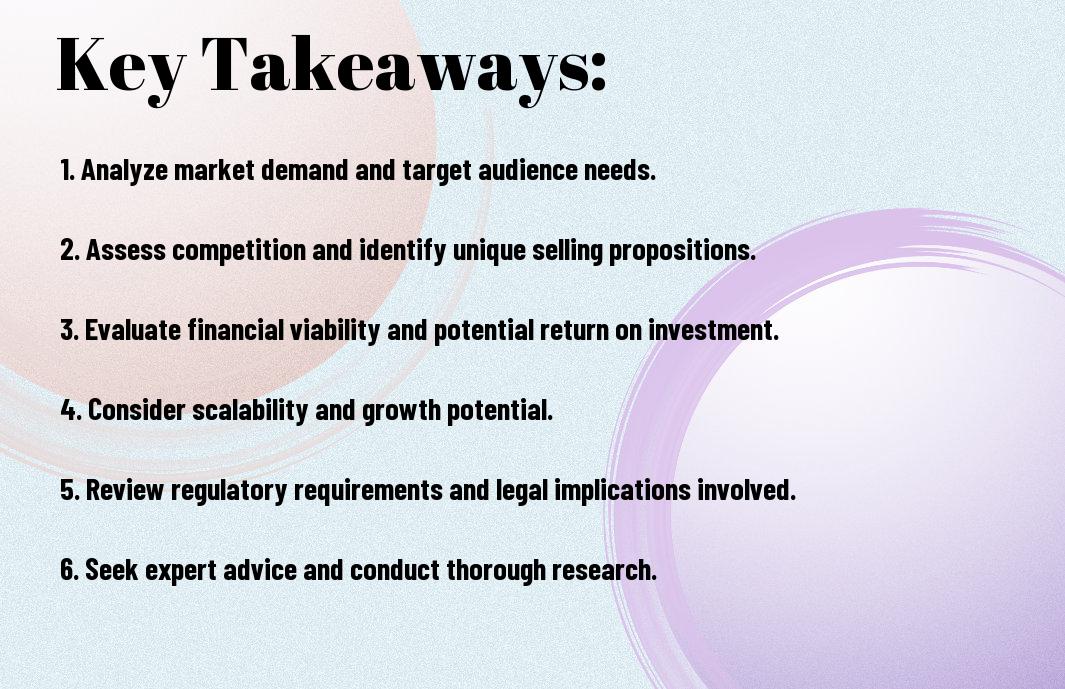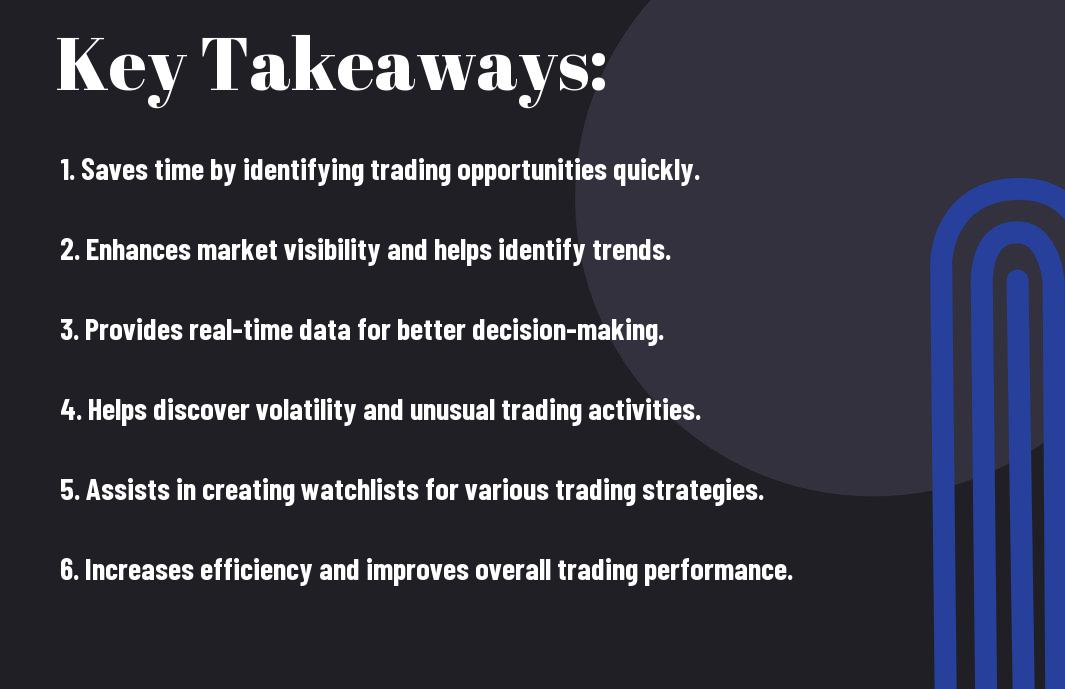Opportunities can present themselves at any moment, but deciding which ones are worth pursuing can be challenging. To effectively evaluate business opportunities, you need to analyze factors such as market trends, competition, potential risks, and your own resources and capabilities. By systematically assessing these elements, you can gain clarity on which opportunities align with your goals and have the best chance for success. This guide will help you develop a strategic approach to making informed decisions about the business opportunities you encounter.
Key Takeaways:
- Market Research: Conduct thorough research to understand the industry landscape and identify potential gaps in the market.
- Financial Viability: Analyze projected costs, revenue potential, and profitability to assess the financial health of the opportunity.
- Competitive Analysis: Evaluate competitors to understand their strengths and weaknesses, which will help position your business advantageously.
- Alignment with Goals: Ensure the opportunity aligns with your personal and business objectives for sustainability and growth.
- Risk Assessment: Identify potential risks associated with the opportunity and develop strategies to mitigate them effectively.


Understanding Market Needs
The key to identifying viable business opportunities lies in understanding market needs. This involves not only recognizing the current demands within your target consumer base but also anticipating future shifts. You can tailor your offerings to align with these needs, creating a stronger position in the marketplace. By conducting thorough research and engaging with your potential customers, you can uncover insights that inform your business strategy and enhance your chances of success.
Identifying Customer Pain Points
On your journey to understanding market needs, be sure to identify customer pain points. These are the specific challenges or obstacles your target audience faces, which create dissatisfaction with existing solutions. Engaging directly with your potential customers through surveys, interviews, or social media can unveil these pain points, enabling you to develop products or services that effectively address their issues and fill gaps in the market.
Analyzing Market Trends
On the pathway to recognizing market needs, analyzing market trends plays a pivotal role. Keeping an eye on the ever-evolving landscape within your industry allows you to anticipate changes and adapt your business model accordingly. You can tap into emerging technologies, shifts in consumer behavior, and evolving preferences to position your business favorably in the market.
Considering market trends helps you stay relevant in a fast-paced environment. By regularly reviewing industry reports, consumer feedback, and competitor activities, you gain valuable insights that guide your decision-making process. This proactive approach enables you to pivot quickly, seize new opportunities, and ensure your offerings resonate with your audience, ultimately leading to sustainable growth and success.
Feasibility Assessment
Clearly, conducting a feasibility assessment is an vital step in evaluating business opportunities. This process helps you determine whether your idea is viable in terms of market demand, operational requirements, and potential challenges. By thoroughly assessing feasibility, you can identify any red flags early on, enabling you to make informed decisions about moving forward or pivoting your approach to maximize success.
Financial Viability
Before submerging into a new business venture, you need to analyze the financial viability of your idea. This includes estimating startup costs, evaluating potential revenue streams, and understanding your break-even point. By creating a detailed financial plan, you can assess whether your project can generate sufficient returns to justify the investment and sustain operations long-term.
Resource Availability
Along with financial considerations, evaluating resource availability is vital for your business opportunity assessment. You must look at the human, technical, and physical resources necessary to implement your idea and ensure the required materials and talent are accessible when needed.
This encompasses evaluating your team’s skills, assessing available technology, and ensuring you have access to necessary physical assets, such as office space or production facilities. By identifying and securing these resources early in the planning stage, you can significantly improve your project’s chances of success and streamline the execution process.
Competitive Analysis
Unlike other evaluations, competitive analysis provides insight into the landscape of your industry. Understanding your competition enables you to identify gaps and areas for innovation. To enhance your skills in this area, consider exploring resources like How to Identify Business & Market Opportunities – HBS Online.
Identifying Key Competitors
Identifying your key competitors is necessary for understanding the market environment. Look for businesses that offer similar products or services and serve the same target audience. Compile a list of these competitors to analyze their strengths, weaknesses, and market strategies.
Assessing Market Positioning
An effective assessment of market positioning involves analyzing how competitors differentiate themselves in the market. This includes examining their branding, pricing strategies, and customer experiences. By looking closely at how they present their offerings, you can identify opportunities to carve out your unique niche.
Another important aspect of assessing market positioning involves determining the perceived value your competitors provide to their customers. Analyze customer reviews and feedback to understand what resonates with consumers. This knowledge will inform your strategic decisions and help you create a compelling value proposition that stands out in a crowded marketplace.
Risk Evaluation
All business opportunities carry inherent risks that can affect your potential for success. Evaluating these risks involves identifying, analyzing, and prioritizing them to mitigate their impact on your venture. By carefully assessing the possible challenges, you can make informed decisions that enhance your business’s resilience and adaptability in a dynamic market landscape.
Market Risks
Evaluation of market risks is crucial for understanding external factors that could impact your business. These include changes in consumer demand, economic fluctuations, and competitive pressures. By analyzing market trends and understanding your audience’s needs, you can adapt your strategies and minimize the adverse effects of these risks on your business.
Operational Risks
About operational risks, these refer to the potential challenges that can arise from internal processes, systems, or people within your organization. These risks may stem from factors such as inadequate processes, human error, or technical failures, which can disrupt your business operations and affect your ability to deliver products or services efficiently.
A comprehensive understanding of operational risks is vital for ensuring the smooth functioning of your business. You should assess each aspect of your operations, including supply chain management, workforce capabilities, and technology dependencies. Identifying vulnerabilities within these areas allows you to implement robust controls and contingency plans, ultimately safeguarding your business against unexpected disruptions.
Developing a Business Model
Keep in mind that creating a solid business model is vital for evaluating any opportunity effectively. This includes understanding the different aspects that contribute to success. Explore The Trinity Method of Evaluating Business Opportunities to guide you in this process.
Value Proposition
With a clear value proposition, you position your business to solve specific problems for your target audience. This statement should outline what makes your product or service unique and why customers should choose you over competitors. A compelling value proposition validates your business idea and attracts potential investors.
Revenue Streams
Proposition your revenue streams strategically to ensure financial sustainability for your business. Identify how you plan to generate income, whether through product sales, subscription fees, or service contracts. Understanding these streams will allow you to forecast performance and adjust your model as necessary.
Indeed, a diverse array of revenue streams can significantly mitigate risks and boost profitability. For instance, consider combining direct sales with recurring subscription models to create a more stable income. Additionally, diversifying your offerings or enhancing service tiers can open up multiple avenues for revenue, ensuring you can adapt to varying market demands. This thoughtful approach can give your business a competitive edge and long-term viability.
Testing the Opportunity
Now that you’ve identified potential business opportunities, it’s vital to test them in a real-world context. This step involves validating your idea through structured methods to assess its viability and market potential. By conducting experiments and gathering data, you can tweak your approach and make informed decisions based on tangible insights, rather than assumptions or guesswork.
Pilot Programs
Beside developing your business plan, launching a pilot program allows you to test your idea on a smaller scale. This controlled environment lets you experiment with operational processes and collect valuable data without the risk of full-scale commitment. It’s an effective way to identify challenges and opportunities while gauging your target audience’s response.
Gathering Feedback
An important aspect of testing your business opportunity is gathering feedback. This involves asking for input from early users or participants and understanding their experiences. Feedback can highlight areas of improvement, confirm what’s working well, and offer insights that may not have been apparent during the initial stages.
Considering feedback as an ongoing process is vital for refining your business concept. Engage with your customers directly through surveys, interviews, or focus groups to gather insightful opinions. Analyze this information to identify trends, preferences, and pain points. This iterative cycle of testing and refining enables you to enhance your offering and better align it with market needs, ultimately increasing your chance of success.
Conclusion
Considering all points, evaluating business opportunities requires a systematic approach that assesses market potential, financial viability, and alignment with your strengths and values. Utilize quantitative data, competitive analysis, and feasibility studies to inform your decisions. Additionally, trust your instincts and experience to guide you. By taking these steps, you can make informed choices that enhance your chances of success and sustainability in your business endeavors.
FAQ
Q: What are the key factors to consider when evaluating a business opportunity?
A: When assessing a business opportunity, it’s important to examine several key factors. First, analyze the market demand, considering if there is a need or desire for the product or service. Next, evaluate the competitive landscape, identifying existing competitors and their market share. Financial viability is also vital; prepare a detailed business plan with projections for costs, revenue, and profitability. Additionally, consider your own skills and experience in relation to the opportunity, as well as the potential for scalability and growth in the future.
Q: How can I conduct market research for a business opportunity?
A: Conducting market research involves several steps. Start by defining your target audience and collecting demographic information about them. Use surveys, interviews, and focus groups to gather qualitative data on customer preferences and behavior. Secondary research through industry reports and market analysis can provide insights on trends and competition. Online tools and social media platforms can also offer valuable data about customer engagement and feedback. Collecting and analyzing this information will help you gain a better understanding of the market environment for the business opportunity.
Q: What metrics should I track to evaluate the success of a new business opportunity?
A: To measure the success of a new business opportunity, track several critical metrics. Key Performance Indicators (KPIs) to monitor include sales growth, customer acquisition cost, and customer lifetime value. Profit margins are vital for understanding financial health, while cash flow statements indicate the company’s liquidity. Monitoring website traffic and conversion rates can provide insights into online performance and marketing effectiveness. Collecting feedback from customers through satisfaction surveys can help gauge overall customer experience and retention, allowing for informed adjustments to the business strategy.



